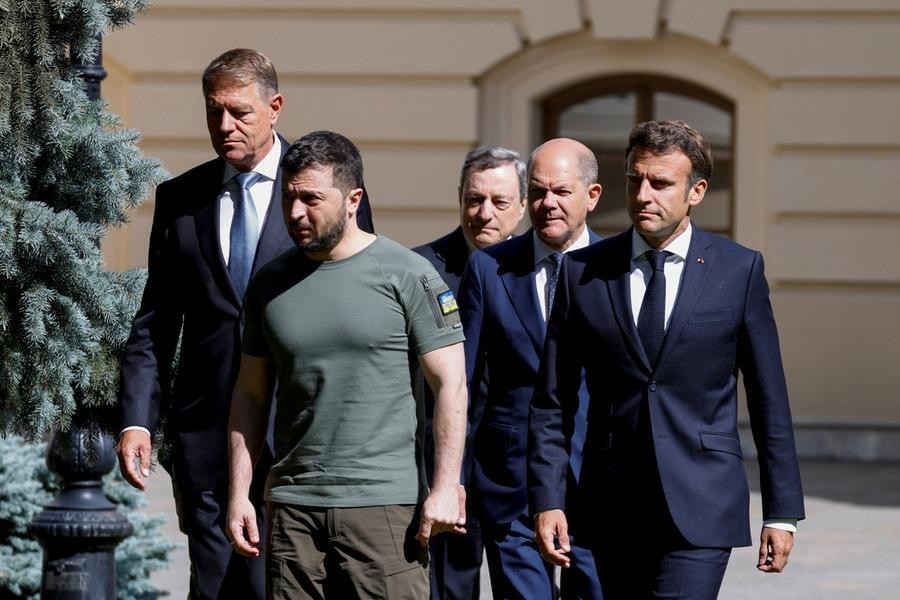The European Union gave its blessing on Friday for Ukraine and its neighbour Moldova to become candidates to join, in the most dramatic geopolitical shift to result from Russia's invasion, news agency Reuters reported.
"Ukrainians are ready to die for the European perspective," European Commission President Ursula von der Leyen told a news conference, wearing Ukrainian colours - a yellow blazer over a blue blouse.
"We want them to live with us the European dream."
Ukraine applied to join the EU just four days after Russian troops poured across its border in February. Four days later, so did Moldova and Georgia - smaller ex-Soviet states also contending with separatist regions occupied by Russian troops.
When President Vladimir Putin ordered his "special military operation" to disarm and "denazify" Ukraine, one of his main objectives was to halt the expansion of Western institutions which he called a threat to Russia.
Leaders of EU countries are expected to endorse the decision at a summit next week. The leaders of the three biggest - Germany, France and Italy - had signalled their solidarity on Thursday by visiting Kyiv, along with the president of Romania.
"Ukraine belongs to the European family," Germany's Olaf Scholz said after meeting Zelenskiy.
Moldova's President Maia Sandu hailed a "strong signal of support for Moldova and our citizens" and said her government was "committed to working hard" to enact the necessary reforms.
Joining the EU requires years of administrative reform - there are 35 "chapters of the acquis" setting out standards to meet in areas from judicial policy and financial services to food safety. Nor is membership guaranteed - talks have been stalled for years with Turkey, a candidate since 1999.
But the ambition to extend the EU deep into the heart of the former Soviet Union amounts to a shift on par with the decision in the 1990s to welcome the ex-Communist countries of Eastern Europe.
If admitted, Ukraine would be the EU's largest country by area and its fifth most populous. All three hopefuls are far poorer than any existing EU members, with per capita output around half that of the poorest, Bulgaria.
All three have recent histories of volatile politics, domestic unrest, entrenched organised crime, and unresolved conflicts with Russian-backed separatists proclaiming sovereignty over territory protected by Moscow's troops.
But in Zelenskiy, 44, and Sandu, 50, Ukraine and Moldova both now have young pro-Western leaders with solid, recent electoral mandates, representing a generation that came of age outside the Soviet Union.
While recommending candidate status for Ukraine and Moldova, the Commission held off for more volatile Georgia, which it said must meet more conditions. Von der Leyen said Georgia had a strong application but had to come together politically.
TROOPS HOLD OUT IN SIEVIERODONETSK
Within Ukraine, Russian forces were defeated in an attempt to storm the capital in March but have since refocused on seizing more territory in the east.
The nearly four-month-old war has entered a punishing attritional phase, with Russian forces relying on their massive advantage in artillery firepower to blast their way into Ukrainian cities.
Ukrainian officials said their troops were still holding out in Sievierodonetsk, site of the worst fighting of recent weeks, on the east bank of the Siverskyi Donets river. It was impossible to evacuate more than 500 civilians who are trapped inside a chemical plant, the regional governor said.
In the surrounding Donbas region, which Moscow claims on behalf of its separatist proxies, Ukrainian forces are mainly defending the river's opposite bank.
Near the frontline in the ruins of the small city of Marinka, Ukrainian police made their way into a cellar searching for anyone who wanted help to evacuate. A group of mainly elderly residents huddled on mattresses in candlelight.
"There's space down here, you could join us," joked one man as the officers came in. A woman named Nina sighed in the darkness: "There is nowhere. Nowhere. Nowhere to go. All the houses have been burnt out. Where can we go?"
In the south, Ukraine has mounted a counter-offensive, claiming to have made inroads into the biggest swath still held by Russia of the territory it seized in the invasion. There have been few reports from the frontline to confirm the situation in that area.
Ukraine claimed its forces had struck a Russian vessel bringing soldiers, weapons and ammunition to Russian-occupied Snake Island, a strategic Black Sea outpost, its first successful strike with a Western-supplied anti-ship missile.


